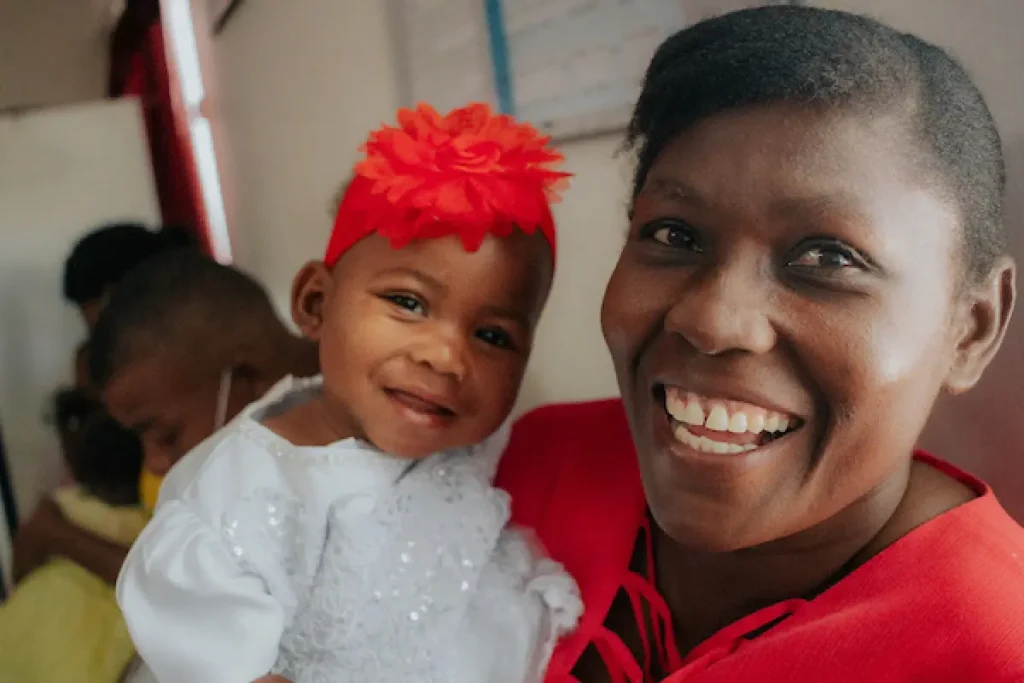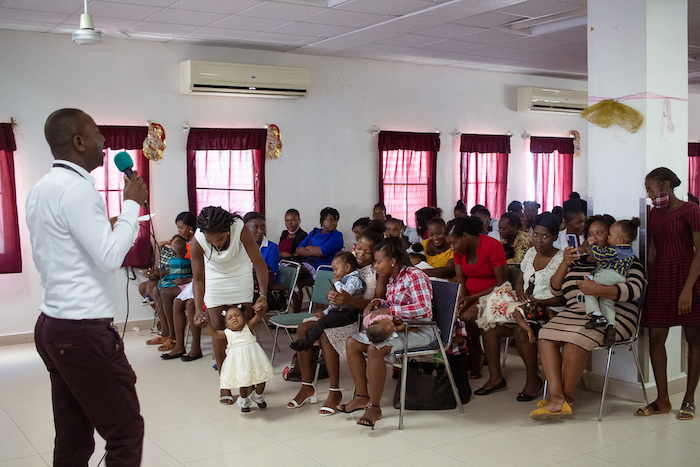Mothers and Babies Receive Long-Term Support Through J-9 Program in Haiti

Thousands of women, newborns supported since the program began in 2018
Posted on May 31, 2022

As a mother of five, Guerline Joseph felt her family was already complete. Then, at 41-years-old came a surprise: she was pregnant again.
At first, no one in the family was excited, but that changed when the baby was born. “We almost have a full soccer team,” one of Joseph’s children joked (in Haitian Creole translated into English) when their sibling arrived. While Joseph was an experienced mother, she still needed support, especially considering her pregnancy was high-risk. During her first trimester, she found the guidance she needed through a program called Journey to 9 Plus–or J-9 for short.
It’s a program based on Partners In Health’s (PIH) accompaniment model, which means being there together, for as long as it takes.
“I love our name: Partners In Health. It’s not just saying you come to us, we’re a hospital. It’s about partnering with the community and that’s what we modeled J-9 off of. The idea is that we are here to accompany our moms and babies and do whatever we can to support them,” says Marc Julmisse, interim executive director of Zanmi Lasante (as PIH is known in Haiti), who initiated the program.
J-9 gives women and their newborns constant care and support throughout pregnancy and through the first year of the baby’s life. Based at PIH-supported Hôpital Universitaire de Mirebalais in Haiti, the integrated model of care has supported more than 2,000 women since it began in 2018 through four key services: group prenatal and pediatric appointments, psychosocial support and counseling, community-based care, and hospital-based services.
Joseph, who was referred to J-9 by a hospital employee, had a challenging pregnancy. She suffered from pounding headaches, high blood pressure, and overall stress. She had five children—ages 23, 19 (twins), 10, and 4—at home already. Through J-9, she worked with a psychologist to learn how to manage her stress, received education about how to recognize signs of serious illness, and went to group workshops to learn about proper nutrition and hygiene for her baby.
She was also encouraged to have a facility-based delivery, becoming one of only 36% of women nationwide who give birth at a health care center instead of at home. Indeed, J-9 has successfully improved uptake of maternal and pediatric services. Since 2019, nearly every woman—about 95%— in the program has had a facility-based delivery. And word has spread quickly throughout Haiti. There are more women interested than the hospital can accommodate. Some women have even given false addresses in Mirebalais, in order to enroll, as the program currently only supports residents in that region. Due to the widespread interest, the team expanded J-9 to the PIH-supported hospital in Hinche (about 34 miles north of Mirebalais) in September. More than 100 women have already enrolled. They’ve also trained PIH colleagues in Mexico and Peru how to replicate the program while also adapting to specific cultures.
A Moment to Celebrate
Upon completion of the program, mothers, their babies, and hospital staff participate in a graduation ceremony, where they receive certificates and hygiene kits. In December, 600 babies graduated. Among them was Sonara, Joseph’s one-year-old daughter.
“We have become very close, and it is very joyful today,” Joseph said on graduation day. “Everyone is very happy to share this moment with their children, their friends, and their family.”

Other mothers expressed their gratitude that such a program exists. One woman, who had severe preeclampsia, ended up suffering from a miscarriage. She felt incredibly alone. In J-9, she didn’t. She felt supported and empowered to ask questions. She went on to have a full-term pregnancy and delivered a healthy baby boy. Feeling overwhelmed with joy, she spoke to graduates and openly shared her journey.
“She was just so delighted with the care that we provided and the accompaniment throughout her pregnancy, delivery, and then for the baby’s first year of life,” says Meredith Jean-Baptise, the hospital’s maternal health coordinator. “Her words were really touching.”
In the future, PIH plans to expand the innovative program to expecting mothers in additional regions of Haiti. Ultimately, the goal is to reduce the country’s maternal mortality ratio—480 deaths per 100,000 live births, as of 2017—which is the highest in Latin America and the Caribbean.
Originally published on pih.org



